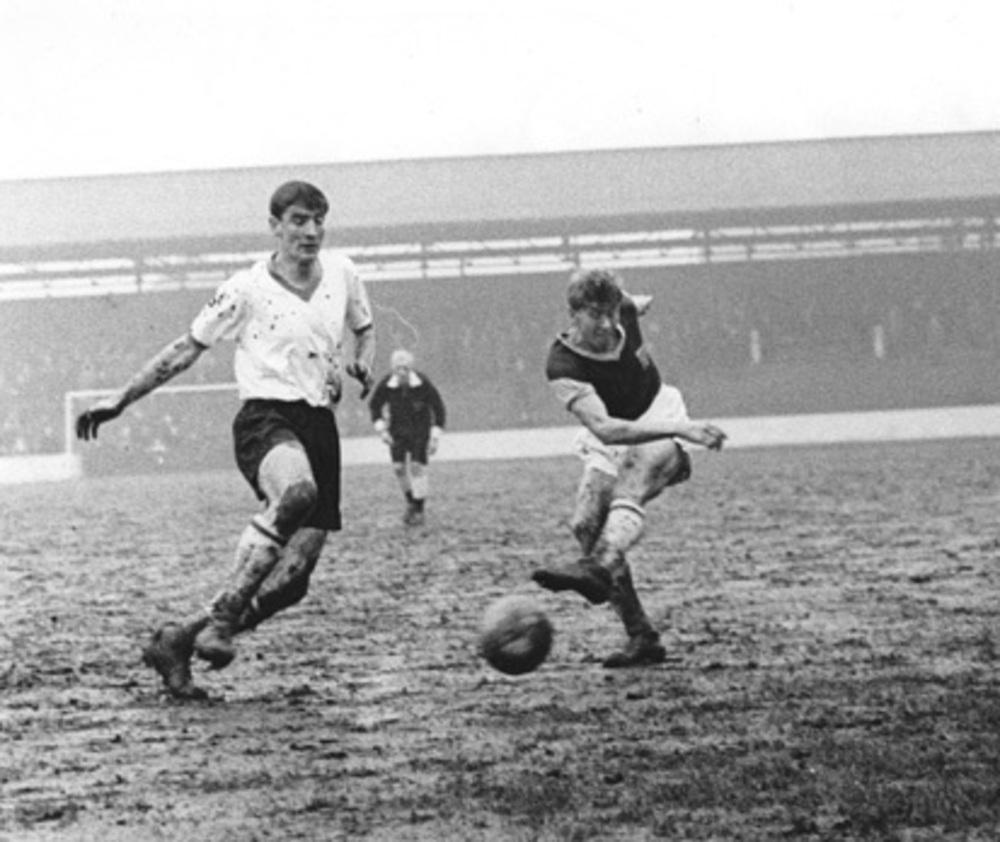
Tommy Bickerstaff was a goalkeeper who started his career at the age of 13 when he played for Glasgow Schools.
He was capped for the Scotland Juniors in 1951 and as a youngster, was also on Celtic’s books for a while.
Professionally, he continued with St Mirren in seasons 1952 to 1954 and Third Lanark in 1954/55 in the Scottish First Division.
From Scotland he moved south to Crystal Palace before, in June 1955, commencing a long association with Tonbridge in the Southern League.
He played 259 games with Tonbridge and was awarded a benefit in March 1960 against an All Star XI, before moving on to Kent League side Tunbridge Wells and then on to Ramsgate back in the Southern League.
He was the Rams’ first team keeper until November 1965, when during a
game against Ashford Town he injured his back so severely that he was forced to quit as a player.
For the next 18 months, he worked at Ramsgate as their club secretary but he had set his heart on becoming a manager.
His chance came at Stevenage Town in 1967, joining a club that had just gained promotion to the Southern League Premier Division - the top level of non-League football then.
He steadied a Stevenage club that was deeply in debt and the team held its own in the Southern League but the off-pitch problems continued and they were forced into liquidation at the end of the 1967/68 season.
As events turned out, Bickerstaff stayed in football and he was offered the manager’s position with another Southern League outfit, Cambridge City where he served from 1968 through to 1974.
In 1969/70 Cambridge won promotion to the Southern League Premier Division and the following season they finished runners-up to champions Yeovil Town.
In relative terms, the next three seasons were less successful and Bickerstaff was sacked by Cambridge in April 1974.
He had been in charge for over 350 games in all competitions.
After his footballing career was over, he went on to become landlord in a Stevenage pub and also became a part of the touring crew for singer Marty Wylde!
Bickerstaff, who had been affected by dementia, died peacefully in Stevenage in January 2016, aged 82.
>Len Round was also goalkeeper born in the West Midlands
In 1944 he started playing for Wall Heath Old Boys, a local league club managed by his father.
In June 1946, he was called up for National Service, joining the Royal Scots Fusiliers and ending up at an Ayrshire camp.
In October 1946 he was given a trial by Scottish League side Ayr United and was immediately signed.
His service took him to India in 1947 but when he returned in January 1948 he returned to Ayr and made his senior debut a month later.
Round had signed semi-professional terms for The Honest Men and took work during the week at Prestwick St Nicholas Golf Club, then for the parks department of the local council.
By the time Round left Ayr in the 1957 close season he had been first choice keeper for eight years, only being dropped in the latter stages of the 1956/57 season, and had made over 300 senior appearances.
He joined Hull City in June 1957 following his release by Ayr and spent a season at Boothferry Park and vied with Billy Bly and Bernard Fisher for the number one shirt.
For the first half of the season, Round was the more regular choice of manager Bob Brocklebank, but after Christmas, Fisher was given a handful of games then Bly was restored, re-establishing himself as first choice.
So, in the 1958 close season Round left the Tigers and in July he headed south to sign for Sittingbourne.
Sittingbourne had just been promoted to the Southern League as champions of the Kent League.
He remained in Kent for eight years, returning to the Black Country in 1966 and played local football into his early 40s and settled back in Wall Heath, playing in the Wolverhampton Amateur League and working as a pattern maker.
He died in nearby Dudley in December 2005.
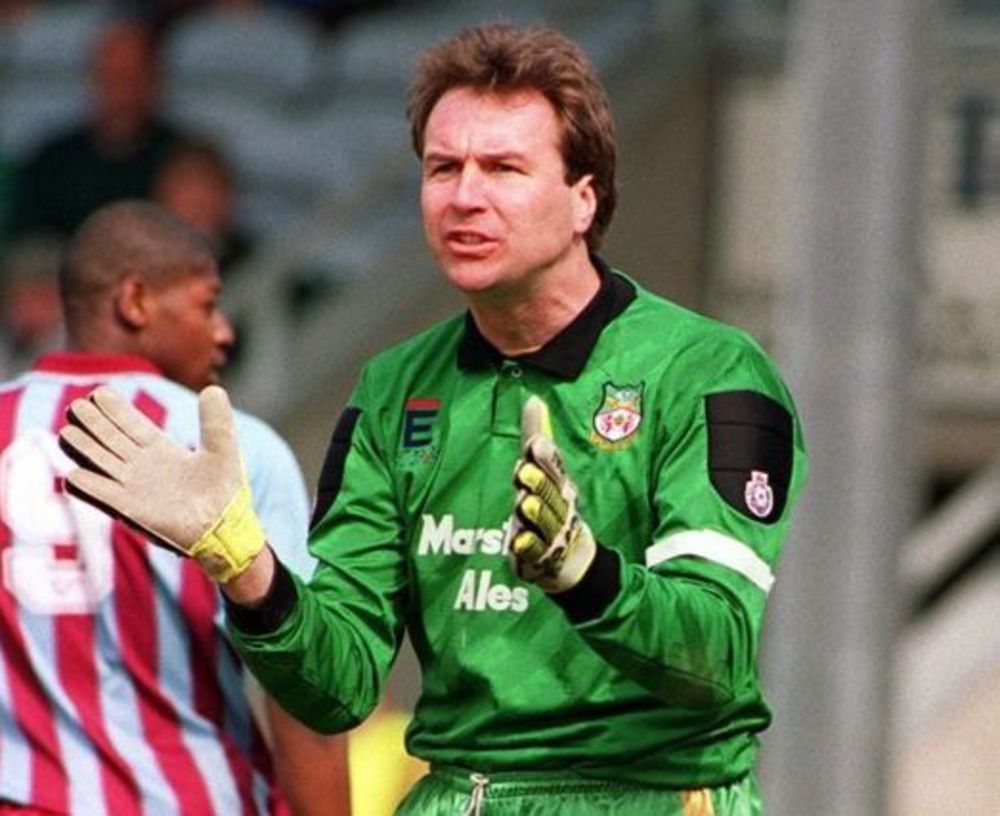
Vince O'Keefe
Another goalkeeper, Vince O'Keefe, started his career at Birmingham City and then Walsall without breaking into their first teams.
In the summer of 1977, he signed for Southern League Premier Division side AP Leamington.
He played 42 times for the Brakes and his form led him to the attention of Exeter City, who he joined in June 1978.
He soon made his League debut when playing in the first match of the season in a goalless draw at home to Walsall.
Sharing the goalkeeping duties with Ian Main, O’Keefe stayed at St James’s Park for two seasons, before making the short move to Torquay United in February 1980, where he was to feature in 108 matches.
In August 1982, he signed for Blackburn Rovers where he added a further 68 appearances to his tally and whilst at Ewood Park he also had loan spells with Bury and Blackpool (on two occasions).
Joining Wrexham in July 1989, O’Keefe played a further 83 League matches, until being released by the Dragons at the end of the 1991/92 season.
By this time he was working for the Professional Footballers Association, later becoming a financial advisor for them. However, he got a surprise recall by Exeter in August 1992 when their regular keeper was unavailable and he played in the opening match against Rotherham United.
He was to return again to play once more against Blackpool at St James’s Park in January 1993.
O’Keefe became goalkeeping coach at Blackburn, but then gave that up to concentrate on his job as a Nottingham-based financial consultant and is also a football agent, with new Wrexham goalkeeper Ben Foster one if his clients.
Barnet were members of the Southern League from 1965 until 1979 after coming out of the amateur Athenian League.
In 1979/80 they became one of the founder members of the Alliance Premier League.
Tony Harding joined Barnet after he had represented Hertfordshire Grammar Schools and London Schools in 1956.
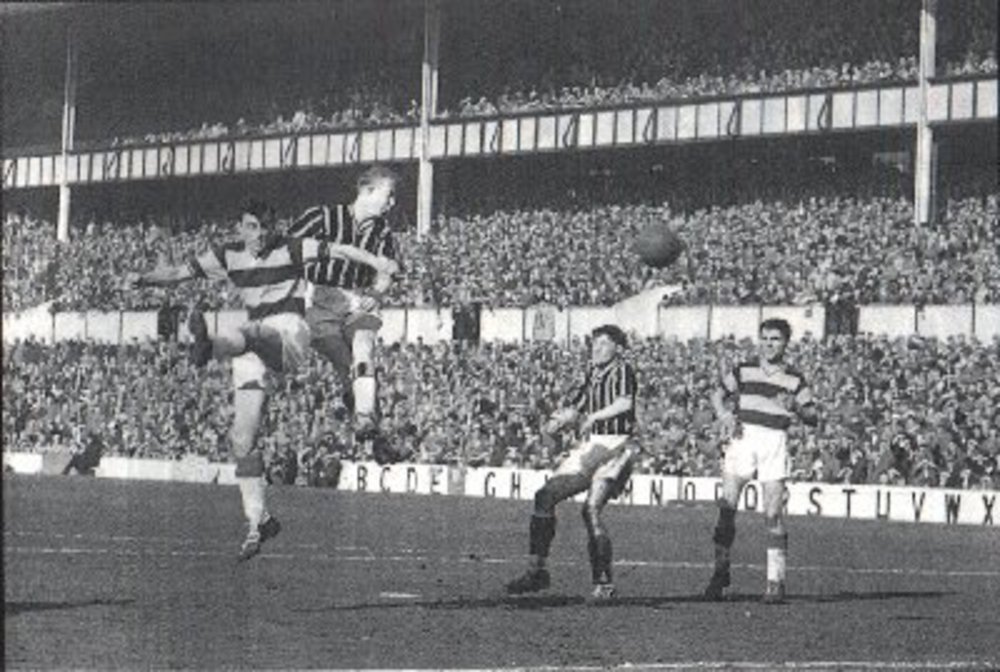
Tony Harding
He left the Bees for spells with Sutton United and then Finchley before he re-joined Barnet in 1958.
His first England Amateur international caps came when he was just 19 years of age, playing against Ireland and Germany.
Not only does Harding possess international honours, but he also represented Great Britain, Southern Counties FA, London FA, Herts FA, Middlesex FA and the Old Grammarians.
He holds an FA Amateur Cup finalists` medal, heading Barnet's second goal in their 2-0 semi-final replay victory over Walthamstow Avenue in 1959.
The match was played at a full White Hart Lane stadium with the drawn semi having been played at Arsenal's Highbury ground - but Barnet were beaten by Crook Town at Wembley in the final.
Addlestone & Weybridge spent just a few seasons in the Southern League, first as Addlestone in 1977 and then as Addlestone & Weybridge from 1980 until they folded in 1985.
However, they had some decent players during that period, including striker Steve Finnieston.
Born in Edinburgh, Finnieston first joined Chelsea as a 12-year-old and signed professional forms at Stamford Bridge in December 1971.
He made his debut for the first team in a 1–1 draw with Leicester City in 1975 and spent time on loan at Cardiff City during the same season, making 9 appearances and scoring 2 goals.
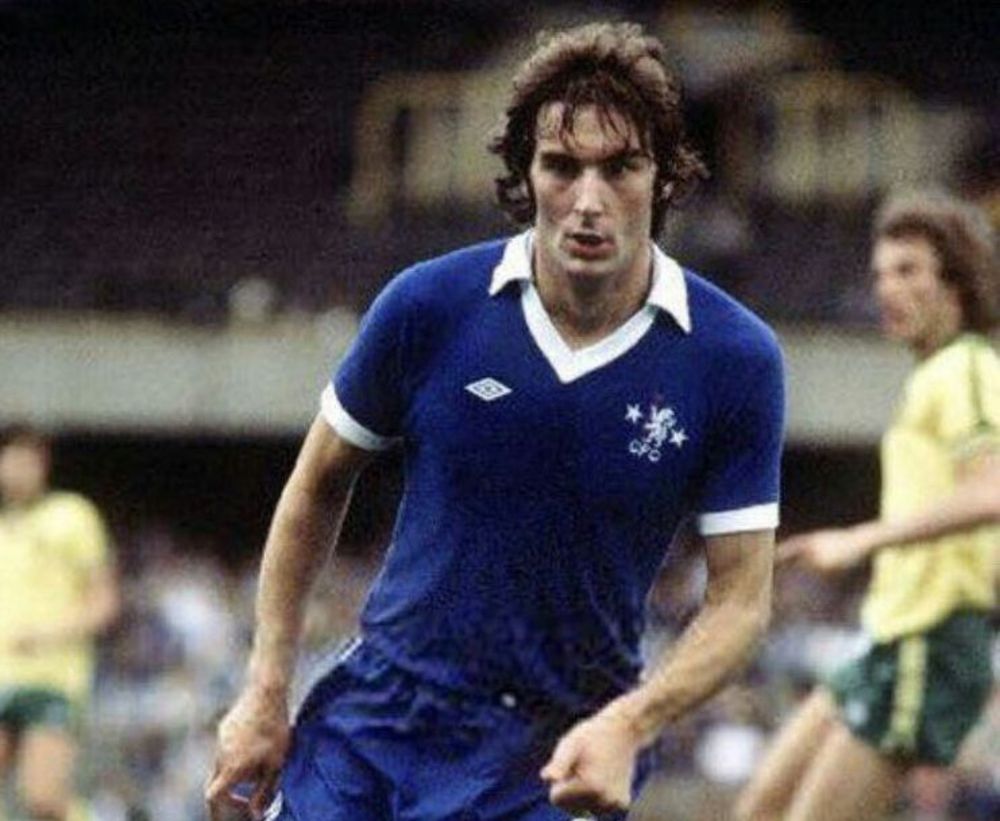
Steve Finnieston
He didn't establish himself as a regular in the Chelsea first-team until 1976/77 and that season was his most prolific, as he struck up an impressive partnership with Kenny Swain and scored 24 goals, including a crucial winner against promotion rivals Nottingham Forest and a final day hat-trick against Hull City.
Chelsea were promoted back to the First Division at the end of the season but thereafter the goals dried up, although he did score in Chelsea's unexpected 4–2 win over European champions Liverpool in the FA Cup Third Round.
He joined Sheffield United in June 1978 and scored 4 goals for them in 23 appearances.
He retired from professional football in 1980 at the age of 25 due to injury but made a comeback a year later in the Southern League with Addlestone & Weybridge and then Hartley Wintney, who were then members of the Combined Counties League.
He later became a postman and worked as a sales rep for Travis Perkins until 2006.
Playing alongside Finnieston at Addlestone was Martin Francis.
The midfielder started his career with Queens Park Rangers.
He is the brother of former QPR, Crystal Palace and England captain Gerry Francis.
He joined Hayes from Hounslow in August 1979 and made 34 appearances, scoring 3 goals.
He left a year later and joined Epsom & Ewell in December 1980.
He moved to Addlestone in 1983.
Dave Crush was a centre-forward who started his career with Tonbridge, making his debut in January 1966.
He became a regular for the Angels and whilst he was leading the line, a teenage Malcolm McDonald was playing at full back!
Crush moved to Ashford Town in the summer of 1967 and scored 40 goals in the Southern League in 129 appearances until 1971 when he switched to Dover.
In July 1975, he signed for Maidstone United and spent a couple of seasons with the Stones until re-joining Tonbridge.
In the summer of 1978 he moved to Margate and was made more into a midfielder by the Gate management.
Spells with Canterbury City, Hastings United and back at Ashford followed before he hung up his boots.
Eric Whitington was a forward who started his career with Arsenal as a schoolboy.
He then joined Chelsea’s groundstaff and whilst at Stamford Bridge, represented England Youth in 1964.
He then signed for home-town club Brighton & Hove Albion and turned professional the same year, and made his debut for the Third Division club in February 1966.
During the 1966/67 season, he was the Seagulls' joint top scorer, alongside Kit Napier, with 10 goals in all competitions, but a perceived lack of pace stopped him establishing himself as a first-team regular.
He was released in 1968 and moved to South Africa to play for Highlands Park, who won the National League title in 1968.
After returning to England, he played for Crawley Town in the Southern League and then moved to Folkestone for a fee of £1,350, Eastbourne United and for Isthmian League side Horsham, where he was the club's top scorer in the 1975/76 season with 25 goals in 42 League games before finishing his career back at Crawley.
His second spell ended in March 1979 by which time he had clocked up 115 games and 67 goals for the Reds.
He is the father of former Huddersfield Town and Crawley striker Craig.
Denis Pring was an all-round sportsman at school in South Wales, playing midweek rugby, Saturday football and cricket for Newport YMCA.
In February 1959, Pring joined Southampton on the recommendation of former Saint Bill Stroud, who mentored the youngster through Newport County’s youth team and reserves.
Soon after signing he was pitched into the first team for a couple of games and then played twice more at the end of 1958/59.
He was a regular member of the Combination side over the next season and a half and was really shaping up in 1960/61, scoring at the rate of a goal every two games, when disaster struck.
In a game at Charlton Athletic, on a waterlogged pitch, Pring suffered severe ligament damage to his right leg. Sent back on after the initial injury, he collapsed a second time and on his return to Southampton, he was encased in plaster from ankle to hip.
At the age of 20, his full-time professional career was over.
Devastating though that was at the time, Pring went for a month’s trial at Poole Town and stayed for ten seasons whilst working as a telephone engineer.
He moved on to Basingstoke Town, where former Southampton favourite Cliff Huxford was player-coach, and then, after a brief flirtation with Fleet Town, he went to play for another ex-Saint, Pat Parker at Hampshire League side Cowes.
And when Parker left, Pring took over as player-manager.
After which, he had a couple of seasons with West End and then enjoyed a long association, both on and off the pitch with ex-Saints.
Having spent more than 30 years at BT, he worked as a porter at Southampton General Hospital for over a decade until he retired to live in Romsey.
Phil Beal played for Surrey boys and England Youth before signing as an amateur for Tottenham Hotspur in 1960 and became a professional in 1962.
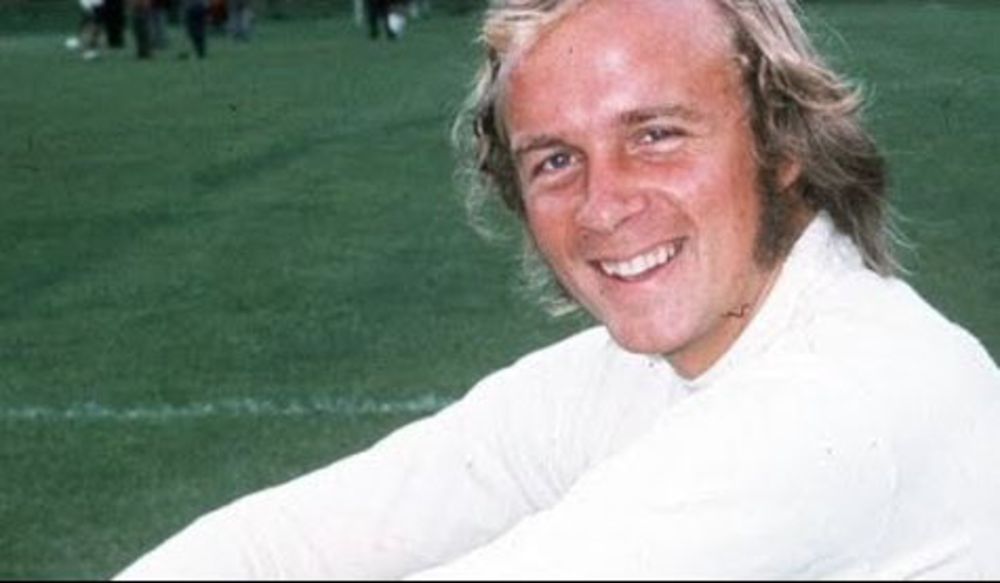
Phil Beal
He made his debut against Aston Villa in 1963, and went on to make 16 appearances in that season.
By the start of the following season Danny Blanchflower had retired with Beal taking on the former captain's right half position but with the team in transition, he only made 8 appearances that season.
The versatile player filled a variety of defensive positions and featured in 21 matches in 1965/66, started in 26 games in 1966/67, but did not feature in the 1967 FA Cup Final because of an injury.
By the late 1960s he had fully established himself in the side and consistently showed his calm, authoritative and composed style.
Beal played in both League Cup winning sides against Aston Villa in 1970/71 and Norwich City in 1972/73.
He played in both matches against Wolverhampton Wanderers in the 1972 UEFA Cup Final in which he collected a winners' medal, and in both legs of the 1974 UEFA Cup Final against Feyenoord.
Beal finished his career with Spurs in 1975 and made 420 appearances including 3 as substitute in all competitions, and scoring just one goal.
He was allowed to sign for Brighton & Hove Albion on a free transfer in July 1975
He then tried his luck in the fairly new North American Soccer League with Los Angeles Aztecs and then Memphis Rogues.
Returning to England, he had a short spell back in the Football League with Crewe Alexandra, playing just 4 times, before finishing his full-time career in September 1979.
However, he played Southern League football with Chelmsford City and then in the Isthmian League with Oxford City, then managed by Bobby Moore with Harry Redknapp as his assistant.
He retired in 1980 and split his time between his home in Devon and Surrey, where he ran a car hire business in West Drayton.
Beal still acts as a match day host at White Hart Lane.
Born in Swindon, Roger Smart was a hard-working forward who worked his way up through his home-town club’s youth ranks - playing for the schoolboy team before making his 'A' team debut in September 1959, and then the reserve team the following April, having just turned 17.
He signed professional forms with Town in May 1960, but he had to wait almost two years for his first team debut in a 1-1 draw at Reading in March 1962.
The following season, Smart was pushed forward into a more-familiar inside forward position, and he scored his first goal for the club on September 1st, 1962, opening the scoring in a 2-2 draw with Queens Park Rangers.
He was still only used sparingly - after making 7 consecutive appearances at the start of the season, he was dropped, before a run of 17 goals in 10 reserve and third team games won him a recall for the final three games of the season.
It was a masterstroke - Smart scoring 3 goals - including both goals in a 2-0 win at Colchester United, and an 88th minute winner against Shrewsbury Town which confirmed the Town's promotion to the Second Division for the first time in their history.
Over the next few seasons, Smart became a first-team regular - missing just 4 league games between the 1965/66 and 1969/70 seasons - his fitness, endeavour and commitment making him the ideal foil for Don Rogers, who was allowed to play in a more free role.
Smart's best form came in 1968/69, when he scored 15 goals - 6 of which came in the League Cup campaign, including the opening goal in the cup final, when he benefitted from a mistake in the Arsenal defence, before bundling the ball into the net.
He was also a part of the Anglo-Italian Cup and Cup-Winners'-Cup winning sides.
In the twilight of his Swindon career, Smart moved back into a wing-half or midfield position.
After making just over 400 appearances over twelve seasons for his home-town club, he left Swindon at the end of the 1972/73 season and joined Charlton Athletic on a free transfer.
After playing 30 times for the Valiants, scoring just the one goal, he returned to the Swindon area just a year later and signed for Bath City in July 1973.
He helped the Romans to finish second in the Southern League Division One South behind Wealdstone, winning promotion back to the Premier Division where they remained until becoming one of the founder members of the Alliance Premier in 1979/80.
In the summer of 1978, he moved to Southern Division One South outfit Trowbridge Town before retiring from playing and becoming the landlord of the Plough Inn in Devizes Road.
Wille Brown was a Scottish centre-forward, born in Falkirk, whose career began as a junior at Burnley, turning professional in February 1967.
His only League appearance for the Clarets came as a substitute for Dave Thomas in a defeat away at West Bromwich Albion in August 1968.
In July 1969, he moved to Carlisle United on a free transfer, but was sent on loan to then-Third Division Barrow in September 1969, scoring once in 6 games.
He returned to Carlisle, scoring 8 goals in 19 league games that season, before leaving for Newport County in August 1970 for a fee of £1,500.
He became a regular goalscorer for County, scoring 50 goals in 168 appearances.
Towards the end of the 1973/74 season, Brown found himself out of favour at Newport, joining Third Division newcomers Hereford United on loan in March 1974, scoring 6 goals in only 9 games for the Bulls.
In November 1974 he joined Brentford for a fee of £4,000, and although he scored 9 times in 16 games, he failed to settle in London and joined Torquay United in March 1975 for a fee of £5,000.
His regular goalscoring soon made him a crowd favourite at Plainmoor and he netted 47 times in 139 games before leaving the full-time game in 1978.
He signed for Southern League Division One South side Minehead and was also employed as their commercial manager.
He helped the North Somerset side to second place in 1979/80 before they were switched to the Midland Division.
Brown hung up his boots and later owned a newsagents in Minehead.
An `old fashioned` centre-forward, Yorkshire-bornGeorge Kirby started his career on Merseyside with Everton.
Signing professional for the Toffees in June 1952, he went on to make 26 first team appearances and scored 9 goals.
He moved to Sheffield Wednesday in March 1959, but played only 3 games for the Owls before moving down to Devon to join Plymouth Argyle in January 1960.
He turned out to be the perfect partner for the smaller Wilf Carter, who would use his pace around the box while Kirby used his physical presence to unsettle Second Division defenders.
He scored 38 goals for the Pilgrims in 93 games before joining Southampton in September 1962.
He helped the Saints reach the FA Cup semi-finals in 1962/63 before losing 1-0 to Manchester United at Villa Park.
After making 63 appearances and netting 28 goals, Kirby switched to Coventry City for a short spell before joining Swansea City for a £12,000 fee in October 1964.
Kirby starred as Swansea reached the FA Cup Fifth Round in 1964/65 having beaten Newcastle United and Huddersfield Town before losing in a replay at home to Peterborough United.
Scoring 8 times in 25 Second Division outings, he joined Walsall in May 1965, playing 75 times and scoring 25 goals.
In 1967, Kirby made the move to the United States with North American Soccer League side New York Generals, managed by Freddie Goodwin.
He became something of a cult hero in the USA and scored 23 times in 43 matches before returning to England.
A short spell with Brentford followed and he then signed for Southern League Premier Division side Worcester City.
After retiring as a player, he became manager of Halifax Town and Watford, and also enjoyed several spells as boss of IA Akranes in Iceland.
He died in March 2000.

Most clubs are looking for volunteers. Find out more on the button below:
www.PitchingInVolunteers.co.ukAll the news and results in one place.
REGISTER